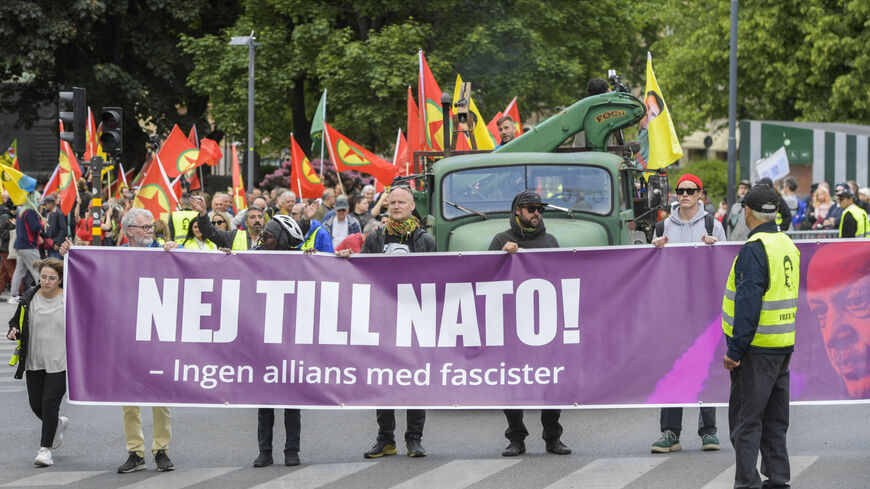ANKARA — Ties between Sweden and Turkey were further strained on Wednesday after a Quran burning protest in Stockholm drew strong backlash from Ankara.
The protest adds a fresh layer of stress to the upcoming talks scheduled for July 6 in a bid to convince Ankara to allow Sweden into NATO. Wedensday also marked Eid al-Adha in the Muslim world.
Turkey’s Foreign Minister Hakan Fidan said on Twitter, “We denounce the Swedish authorities' assent to ... burn the Quran in front of a mosque on Eid al-Adha. Turning a blind eye to such hideous acts is being complicit in crime.”
Turkish President’s chief foreign policy advisor Akif Cagtay Kilic also lashed out at the incident. “I condemn all the people and institutions that allow this,” he said.
Swedish authorities blocked similar protests over the past months after a Quran burning near Turkey’s embassy in Stockholm earlier this year prompted Ankara to pause ongoing NATO talks. However, earlier this month the Supreme Court of Sweden ruled that the blocking was unlawful, paving the way for fresh protests.
“We strongly condemn the Swedish Supreme Court's policy of condoning hate crimes,” Fidan wrote on Wednesday.
Abandoning their historic military non-alignment policy, Sweden and Finland applied to join NATO in face of the Russian invasion of Ukraine. Finland became a member in April, but Turkey and Hungary have yet to ratify the Swedish bid. All NATO members' consent is required. Turkey demands that Stockholm crack down on individuals and groups that Ankara considers terrorists. Sweden changed its counterterrorism laws and amended its constitution, but Ankara has pressed for more, including extradition or deportation of dozens of individuals over their alleged ties to terrorism.
NATO as well as the Biden administration and the majority of alliance member states have been pressing to finalize Sweden's accession before the alliance’s annual summit on July 11-12 in the Lithuanian capital Vilnius in a bid to present a strong united front against Russia.
Yet, Ankara’s NATO demands do not only concern Sweden. As Al-Monitor reported earlier this week, Turkey was also pressing the alliance for the Bosphorus and Dardanelles straits connecting the Black Sea to the Aegean to be referred to as the “Turkish Straits” in the alliance’s new defense strategy.
The cautious optimism which emerged after Turkey’s elections last month that Ankara might greenlight the Swedish accession is slowly withering away, according to experts.
Soner Cagaptay, director of the Turkish Research Program at the Washington Institute for Near East Policy, said that chances for a ratification before the summit are “close to zero.”
“Maybe some positive momentum was building up. I think the Quran burning incident basically swept much of that away,” Cagaptay told Al-Monitor. “There was a lot of pressure building up on Turkey, especially on new foreign minister Fidan from Washington. … He can now basically say, ‘sorry, not while you have these incidents that are offensive to Turks and Islam.' ”
Ankara may also be trying to make the Swedish NATO bid a touchstone for future policy, Cagaptay believes. “I think Turkey's foreign policy elites really would like to make a case to use the Swedish accession to NATO as a precedent so that NATO member countries incoming and present will not have ties with the PKK or its broader family or tolerate its activities,” Cagaptay said in reference to the outlawed Kurdistan Workers Party, which has been fighting for self-rule inside Turkey since 1984.
Sweden hosts a large Kurdish minority diaspora, many of whom escaped Turkish political persecution.
“So the bar is really a tall one for Sweden,” Cagaptay noted. “I think that we'll see some kind of a grand bargain.”
Meanwhile, the sense of urgency to join the alliance is also fading away, on the part of Sweden. Aron Lund, fellow at Century International, based in Stockholm, said, “Most Swedes are obviously frustrated by the delay, but there’s no sense of panic. People here were horrified by the Russian assault on Ukraine, but the sense of immediate threat that existed in spring 2022 has faded.”
He added that Sweden still expects to join the alliance. Support has "gone up by another 20 percent and is now at its highest point ever. It’s rare to see that level of unity about anything in Sweden,” he said.








